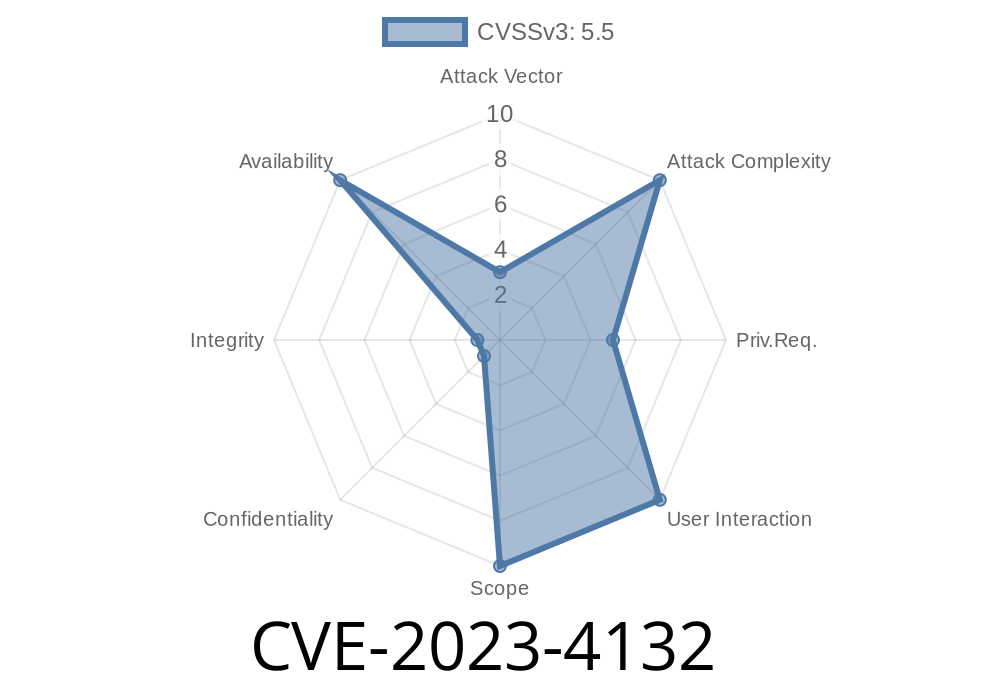A critical security vulnerability, CVE-2023-4132, was discovered in the Linux kernel, specifically within the smsusb module used to handle Siano digital TV devices. The bug is classified as a use-after-free flaw that appears when a Siano device is connected (plugged in) to a Linux system. If exploited, it allows a local user to crash the system, causing a denial of service (DoS) condition.
What is CVE-2023-4132?
A use-after-free vulnerability means the operating system tries to use a piece of memory after it’s been marked as “free”—basically, using something that’s already been thrown away.
In this case, it happens during the initialization of a Siano device (using the smsusb module) when it’s plugged into a USB port. If you’re running a Linux system that has the smsusb driver enabled, a local user (not necessarily the root user) could exploit this bug to crash the kernel.
Severity: High
Impact: System crash (denial of service)
Access required: Local (physical access to plug in a device, or sometimes limited shell access)
Vulnerability Details (Plain English)
When you connect a Siano USB device, the driver allocates a structure in memory for that device. Due to a bug, this memory structure can be freed too early during device initialization if certain error conditions are met. But the kernel code may still try to access this freed memory, leading to a crash.
Code Snippet: Where the Bug Lives
The vulnerable code is in the file drivers/media/usb/siano/smsusb.c in the Linux kernel tree. Here is a simplified version to illustrate (from upstream patch):
static int smsusb_init_device(struct usb_interface *intf) {
struct smsusb_device_t *dev;
dev = kzalloc(sizeof(struct smsusb_device_t), GFP_KERNEL);
if (!dev)
return -ENOMEM;
usb_set_intfdata(intf, dev);
// ...setup code...
if (error) {
kfree(dev);
// ERROR: interface data still points to a freed structure!
// Fix: set usb_set_intfdata(intf, NULL);
return error;
}
return ;
}
If an error occurs after kfree(dev);, the pointer stored in usb_set_intfdata(intf, dev); still points to the freed memory. Later kernel code might try to access it, leading to a use-after-free and possibly a crash or worse.
#### Patch/Fix Example
The fix is to clear the interface data
if (error) {
kfree(dev);
usb_set_intfdata(intf, NULL); // FIX: clear the pointer
return error;
}
Plug in a Siano USB device (or even a specially crafted fake device).
2. Ensure the kernel encounters an error during the interface setup (could be triggered by manipulating the device or the timing).
The kernel would then use a pointer to freed memory and crash, taking down the whole system.
This can also be triggered from userspace, if you have a way to force the driver to reload, or control what device is being attached (such as with removable media).
(Proof-of-Concept) Exploit Steps
> Warning: The following is for educational purposes only!
# As a local user
modprobe smsusb # Load the driver (might need sudo)
# Physically plug in a malformed Siano device OR use USBFuzz tools (https://github.com/ucsc-security/USBFuzz)
# Observe that dmesg now contains a kernel panic or crash
Alternatively, creating a fuzzed USB device descriptor that confuses the driver can accomplish the same.
Any Linux system using the smsusb (Siano) driver
- Kernel versions before the patch (commit f690f30bf925)
Distributions like Ubuntu, Debian, Fedora, openSUSE, etc., that ship this driver
Most desktop and laptop users are NOT affected unless they use Siano digital TV USB sticks or similar devices. However, kernel versions pre-September 2023 may still have unpatched code.
Update your kernel.
Make sure you are running a Linux kernel 5.15.125 or later, or any version containing the f690f30bf925 commit.
`bash
echo "blacklist smsusb" | sudo tee /etc/modprobe.d/blacklist-smsusb.conf
References and Further Reading
- CVE-2023-4132 at NVD
- Upstream Linux Kernel Patch (commit f690f30bf925)
- Debian Security Advisory
- Ubuntu Security Notice
Final Thoughts
CVE-2023-4132 is a classic use-after-free bug that shows even rarely-used drivers can be a backdoor for local attacks. Keep your systems patched and disable unneeded drivers to stay safe!
If you want to dig deeper or try fuzzing USB devices on your own test systems, check out USBFuzz.
Timeline
Published on: 08/03/2023 15:15:00 UTC
Last modified on: 09/10/2023 12:16:00 UTC
